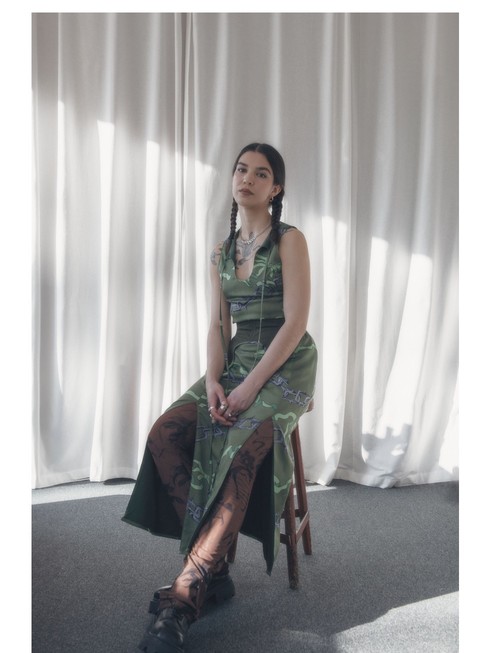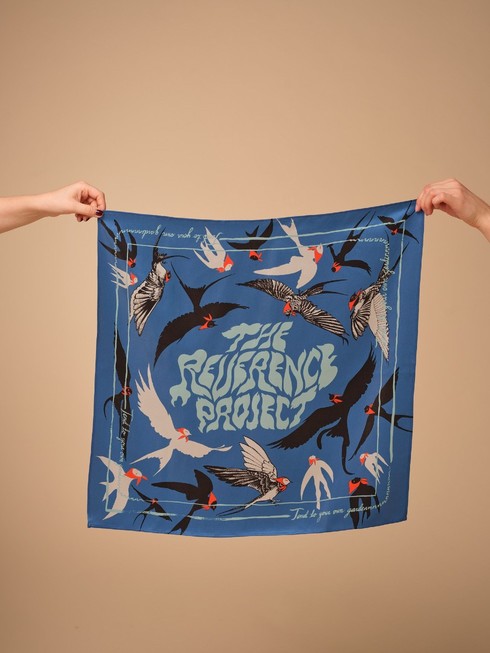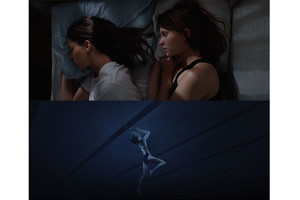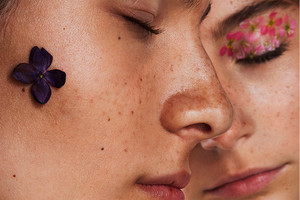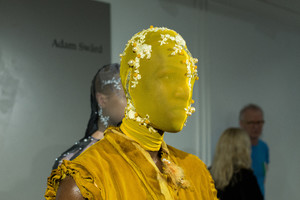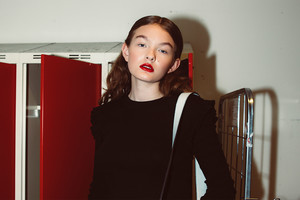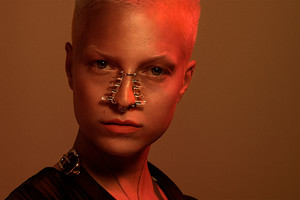An interview with Felicia Halén Fredell, the founder of The Reverence Project
Written by Ulrika LindqvistFashion designer Felicia Halén Fredell launched The Reverence Project in April 2024. TRP takes it’s inspiration from their muses, their first collection being inspired by activist and poet Nattalie Ström Bunpuckdee. We had a chat with Felicia about her inspirations and the future of The Reverence Project.
Please tell me a bit of your backstory, what did you do before launching The Reverence Project and what was the idea behind it?
Like so many others the pandemic really affected me mentally. As a freshly graduated fashion designer I felt chewed up and spat back out, close to a burnout. My field completely lost its appeal and I was really stuck in a mindset of counting the fashion industry’s faults - the list goes on and on. It made me feel really powerless and at times even apathetic. I had too much time on my hands to think about what really matters. I realize this differs from person to person but for me, I concluded that meaningful and challenging conversations are what makes my life worth living. More than one person in my life said I was a good listener and I took that to heart and ran with it, that’s all I’d ever like to be. This idea kept on growing and brewing for years, and when you can’t seem to let go you know you have to realize it somehow. I wanted to create designs centered around other people’s perspectives. I wanted the privilege of getting to know people and zoom past small talk to where we talk about what matters most to them and why. I kind of found The Reverence Project to be a hack of sorts. It’s essentially about hope and how sharing experiences and stories with others make you feel less alone. It’s really empowering to be the trailblazer who first talks about their experiences, but it’s also really empowering to hear someone put your experiences into words for the first time as well.
What is your inspiration behind your designs?
The potential of fashion is endless because it’s a fine-tuned language, stories can be weaved into garments in so many ways. By now I’ve developed this standard form based on my first muses that basically is a template for an interview. I ask them about their relationship to their body, does clothes usually serve as a uniform, armor or creative expression? And then we talk about the relationship to the self. Are there recurring life themes that have shaped them as a person? Is there anything they wish someone would ask them? These conversations usually lead to really beautiful, vulnerable and fulfilling places, and I try to share some bits and pieces of myself so it doesn’t feel exploitative for the muse. When they word something in a hard-hitting way it usually becomes a visual metaphor that I can use in my design. It often ends up becoming prints or draping that is meant to represent the muse’s story. Whether it translates is a completely different thing, but how my design is received and further interpreted is just as interesting.
Please tell us more about your muses?
Anyone could be a muse, because everyone has a story to tell. But I sometimes describe my muses as unintentional activists. They’re the type of person who can’t help but to speak their mind in the eye of injustice. Maybe the mood at the dinner table becomes a little uncomfortable, but they sleep well at night knowing that they stood up for something they believe in. At first my muses were close friends who became my patient testing guinea pigs. I slowly developed the questions that I figured led to those radically vulnerable conversations. At its core The Reverence Project aims to be unapologetically intersectional feminist and so the muses often reflect that. Voices that are seldom heard should be amplified. And it’s my pride and joy to weave their stories into garments.
What would you say are the 3 core values for The Reverence Project?
Radical vulnerability - because it takes great strength to be soft.
Authenticity - depicting my muses in a respectful and empowering way is something I take very seriously.
Existential sustainability - it basically means hope, giving people hope through our shared stories.
How would you describe your customer?
I think my customer in many cases are very similar to my muses. They often stand for something, and in doing so stand out. Since their identity is a bit of a statement, blending in was never an option. They might as well dress expressively as well in colors, prints and silhouettes that can be exaggerated. It’s all a springboard towards expressing personal thoughts and ideas. I think my customers often consume a lot of culture in all its shapes and forms, fashion is just another of many interests and they happen to like something quite feminine even if they don’t necessarily always identify as a woman. But they’re daring in their softness and relate to specific stories and therefore garments from The Reverence Project as well.
What have been the most challenging aspects of launching The Reverence Project?
I think the fact that I’m alone in my business thus far. I’m surrounded by a lot of great creators and creatives that I’ve collaborated with while developing the brand. But as of now I don’t have a team and it’s probably the big thing up ahead of TRP.
What can we expect from The Reverence Project in the near future?
Expect more interviews with muses who wear their heart on their sleeves. And with them looks developed specifically after their stories that are jam-packed with meaning. But don’t expect them in the tempo of a fashion brand that shows collections several times per year during fashion weeks. When you least expect it, we might drop a beautiful story for you to enjoy!

